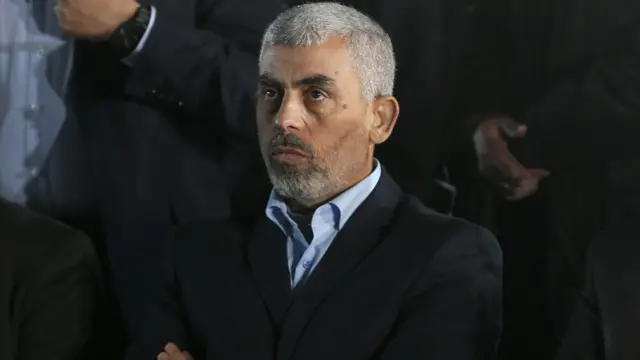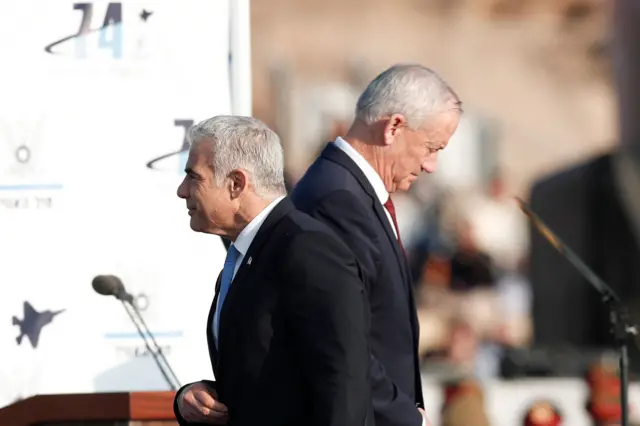
image source, EPA
The Israeli Public Prosecution is investigating a case of leaking security information, which it described as “sensitive,” involving the office of Israeli Prime Minister Benjamin Netanyahu, according to the Israeli press.
The Rishon Lezion Magistrate’s Court announced in a statement the arrest of a number of suspects on Friday in connection with the leak of confidential documents from the Prime Minister’s Office, according to the Jerusalem Post.
The Israeli newspaper Maariv quoted Judge Menachem Mizrahi as saying, “This poses a threat to sensitive information and sources of information, as well as harming the achievement of the goals of the war in the Gaza Strip.”
The newspaper added, quoting Mizrahi, that “a joint investigation between the General Security Service (Shin Bet), the Israel Police, and the Israeli Army began last week, which relates to suspicions of security damage due to the illegal provision of classified information.”
While the office of Israeli Prime Minister Benjamin Netanyahu denied its involvement in this case, saying, “Contrary to the false reports and appearances that they are trying to portray in the media, no one from the Prime Minister’s Office has been investigated or arrested,” according to Maariv newspaper.
According to Israeli 12, the repercussions on other offices are being examined, indicating the involvement of the offices of other officials in the case.
Yedioth Ahronoth, citing sources familiar with the case, says that the detained suspect is a “scapegoat,” which indicates that other officials may have played larger roles in the series of leaks, according to it.
It adds, “The authorities continue to examine whether senior officials may have indirectly approved the unauthorized release of confidential documents to foreign media.”
Who is involved from Netanyahu’s office?

image source, maariv
The Israeli press says that Netanyahu’s office wanted to employ a person as an official spokesman for security affairs, but he did not obtain a security clearance from the General Security Service (Shin Bet), due to “suspicions,” according to the description of the Jerusalem Post.
The newspaper states that, “although he did not obtain a permit, he “accompanied Netanyahu to discussions at the Hakariya military base and secret military units, and the minutes of the political security ministerial council meetings and sensitive security discussions were also revealed.”
The Prime Minister’s Office responded shortly after that one of the people arrested was not an official employee of the office,” according to the Jerusalem Post.
However, Maariv newspaper published a screenshot from the Israeli Channel 12 clearly showing the detainee present at the hearing in the Prime Minister’s Office.
A person close to the detainee told Israeli Channel 12: “He – the detainee – worked for Netanyahu and was his advisor during the past year and a half.”
He added that he “devoted his entire life to the prime minister and was willing to risk himself for him, but as soon as the news broke, Netanyahu threw him under the wheels and lied that he did not work for him.”
Yedioth Ahronoth newspaper said that insiders confirmed that “the suspect maintained close relations with Netanyahu’s inner circle, where he conducted diplomatic missions under the supervision of Netanyahu’s chief of staff, Tzachi Braverman.”

image source, Yedioth Ahronoth
The clear evidence of a “leak”

image source, EPA
The Jerusalem Post says the information was leaked to German news site Bild and other Israeli journalists, leading to the publication of a report last September.
Yedioth Ahronoth newspaper explains that the report reveals “a document supposedly written by Hamas leader Yahya Sinwar.”
It says, “The document details Hamas’ negotiating strategy with Israel, and provides advice on how to manipulate the international community while seeking to rebuild military capabilities and intensify pressure on Israel,” according to it.
It turned out that another report was published in the Jewish Chronicle newspaper, citing a Hamas document that claimed that Hamas aimed to transfer hostages through the Philadelphia Corridor to Iran or Yemen, which prompted Israeli army investigators to consider this document a “forgery,” which means that it was not from Written by Sinwar himself, according to Yedioth Ahronoth.
Within days of publishing these reports, both Bild and the Jewish Chronicle faced backlash, which led to the Chronicle retracting its story after determining that the aforementioned document had no basis and that the author’s name was fabricated.
Yedioth Ahronoth says that this revelation “prompted greater scrutiny of how the materials confiscated from Hamas were manipulated to influence public opinion in Israel regarding the Gaza war.”
Israeli political reactions

image source, EPA
Israeli opposition leader Yair Lapid and National Unity Party head Benny Gantz placed full blame for the leak of the documents on the prime minister.
Gantz responded to Netanyahu’s office’s statement, saying, “Without going into the details of the case under investigation regarding the activities of the Prime Minister’s Office, it is important to emphasize one thing, that the Prime Minister is responsible for what happens in his office. For better or for worse.”
While Lapid commented on the issue on the “X” platform, “The Prime Minister, as usual, is trying to distance himself from the matter and place responsibility on others, but the facts say the opposite: he is personally responsible for every paper, word, and information issued by his office.”
In turn, the Prime Minister’s Office responded to Lapid’s statements, saying, “It is not a coincidence that the Prime Minister demanded that the gag order on the investigation be immediately lifted, the continued implementation of which aims to discredit his office,” according to Maariv newspaper.
The office added, “There are dozens of leaks published in the media at home and abroad that revealed details about negotiations to return the hostages, secret cabinet meetings and other sensitive forums, without investigating anyone. I wonder why?”
Yedioth Ahronoth believes that the investigation into the secret leaks has intensified tensions between Netanyahu’s office and the Israeli defense establishment, highlighting the growing divisions over Gaza policy and hostage negotiations.
ظهرت في الأصل على www.bbc.com

